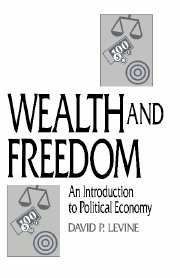6 - Labor
Published online by Cambridge University Press: 20 March 2010
Summary
Wages
As I have emphasized, a capitalist economy is one in which one's welfare depends on the value in the market of the assets that one owns. In this chapter I consider the challenge making welfare depend on exchange poses for those whose income depends on sale of their laboring capacity.
This is a particularly important problem for political economy. In a capitalist economy, the wage is the price of a commodity. If the price is set by the market, and without government regulation, what will assure that it is adequate to allow the worker to purchase the things he or she needs? Even if the price is appropriate, will the demand for labor be sufficient to assure that all those who depend on wages for their livelihood will find employment?
First, we need to consider what constitutes an adequate wage. For manufactured goods, we can more or less easily determine what price is adequate to the seller if we know the costs of production. The price must at least cover those costs, which depend primarily on the nature of the plant and equipment, the cost of material inputs, and the cost and quality of labor. Can we make any comparable calculation for labor?
The classical economists thought we could. Adam Smith, David Ricardo, and Karl Marx all argued that labor has a cost of production “like all other things which are purchased and sold” (Ricardo 1951, p. 93).
- Type
- Chapter
- Information
- Wealth and FreedomAn Introduction to Political Economy, pp. 65 - 74Publisher: Cambridge University PressPrint publication year: 1995



